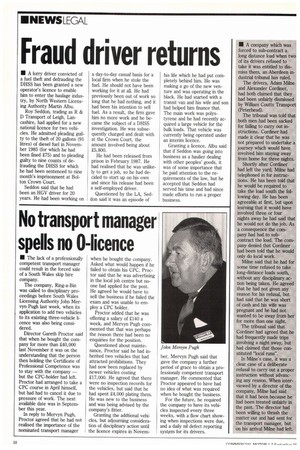• A company which was forced to sub-contract a long
Page 6

If you've noticed an error in this article please click here to report it so we can fix it.
distance load when two of its drivers refused to take it was entitled to dismiss them, an Aberdeen industrial tribunal has ruled.
The drivers, Adam Milne and Alexander Cordiner, had both claimed that they had been unfairly dismissed by William Coutts Transport (Peterhead).
The tribunal was told that both men had been sacked for failing to carry out instructions. Cordiner had made it clear that he was not prepared to undertake a journey which would have involved him staying away from home for three nights.
Shortly after Cordiner had left the yard, Milne had telephoned in for instructions. He has been told that he would be required to take the load south the following day. He has been agreeable at first, but upon learning that it would have involved three or four nights away he had said that he would not do the job. As a consequence the company had had to subcontract the load. The company denied that Cordiner had been told that he would only do local work.
Milne said that he had for some time refused to take long-distance loads south, without any disciplinary action being taken. He agreed that he had not given any reason for his refusal, but had said that he was short of cash and his wife was pregnant and he had not wanted to be away from her for more than one night.
The tribunal said that Cordiner had agreed that he had frequently made trips involving a night away, but had claimed that those constituted "local runs".
In Milne's case, it was a clear case of a deliberate refusal to carry out a proper instruction without advancing any reason. When interviewed by a director of the company, Milne had said that it had been because he had been treated unfairly in the past. The director had been willing to thrash the matter out and had sent for the transport manager, but on his arrival Milne had left.
















































